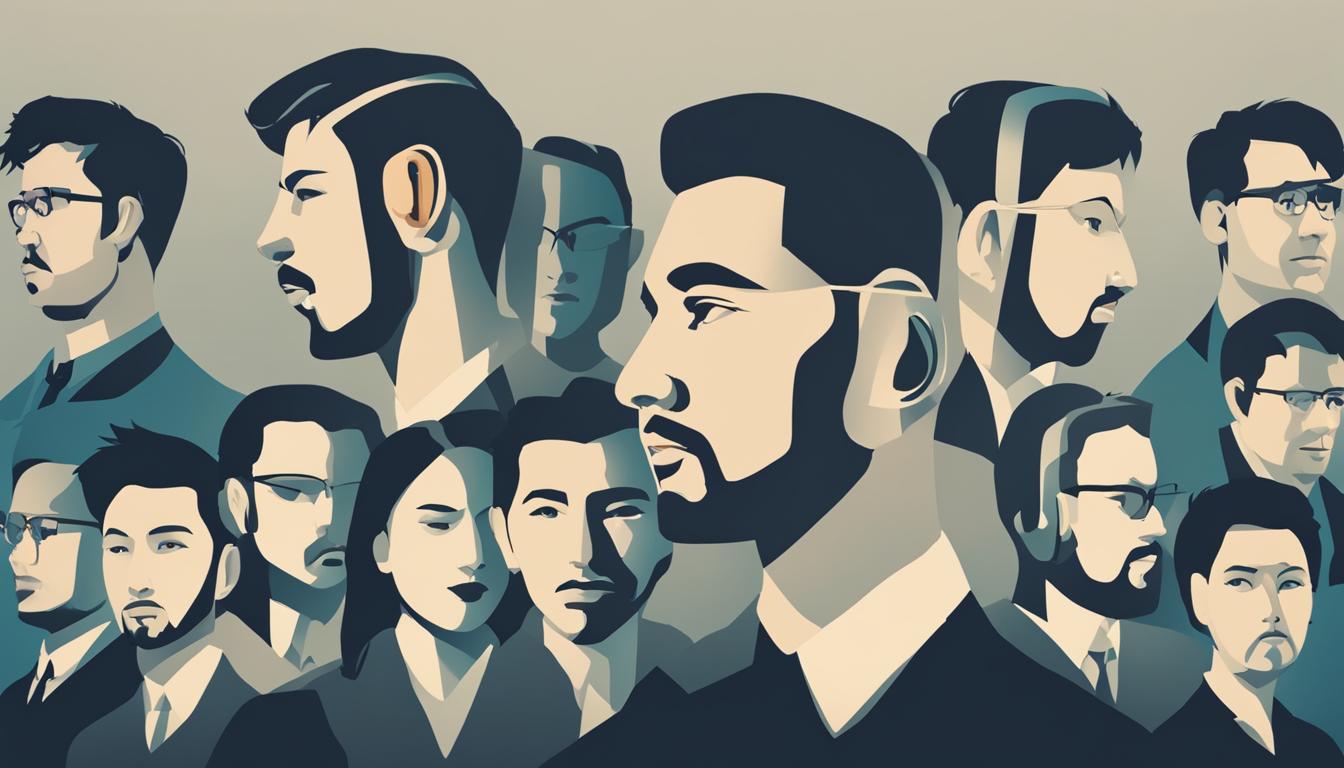In this article, I will explore the diverse range of audiobook narrator voice types. As an avid listener and a professional copywriting journalist, I understand the importance of selecting the right voice type to bring a story to life. Whether you prefer mystery, romance or science fiction, the key to a captivating audiobook lies in choosing the perfect voice to transport you on your next auditory adventure.

Key Takeaways
- Voice selection is crucial for creating a captivating audiobook narration experience.
- Audiobook narration involves a diverse range of voice types catered to different genres, characters, and storytelling styles.
- Selecting the right audiobook narrator voice type can be a daunting process, considering factors such as genre compatibility, character requirements, and narrator style.
- The evolving landscape of audiobook narration is marked by trends such as the rise of celebrity narrators, the emergence of diverse voices, and the impact of technology on audiobook production.
- Stay up-to-date with the latest developments in audiobook narration to make informed decisions when selecting the perfect voice for your next project!
Understanding the Importance of Voice Types in Audiobook Narration
As a narrator, it’s not just about reading out loud. Your voice is a critical tool in engaging listeners and bringing the story to life. This is why selecting the right voice type is of paramount importance in creating a captivating audiobook.
The tone, pitch, and overall quality of a narrator’s voice play a crucial role in shaping the listener’s perception of the story. A narrator with a deep voice, for instance, may work well for a thriller or horror novel, whereas a gentle and soothing voice may be better suited for a romance novel.
When a voice type is mismatched with the story, it can cause the reader to lose focus and interest, ultimately decreasing the overall enjoyment of the book. Choosing the right voice type is, therefore, crucial in ensuring the success of an audiobook.
But selecting the perfect voice is not always an easy task. It requires careful consideration of the genre, the narrative style, and the character’s voices. On top of that, the selection process of voice types changes frequently with the evolving nature of the audiobook industry.
In the next section, we’ll delve deeper into specific voice types commonly used in audiobook narration and provide tips on how to select the right vocal match for your next audiobook project.
The Various Voice Types in Audiobook Narration
As an audiobook narrator, I know firsthand the importance of selecting the right voice type to enhance the listener’s experience. There are various voice types used in audiobook narration, each catering to genres, characters, and storytelling styles. For instance, while a deep, resonant voice may capture the thrilling essence of a mystery, a warm and soothing voice may bring comfort to a romance novel.
It’s essential to understand how each voice type conveys the story’s emotions, establishes character identities, and supports the overall storytelling experience. By doing so, the listener can immerse themselves in the story’s world more fully.
From character voices to narration styles, audiobook narration requires a diverse pool of voice types to create a captivating, engaging, and immersive experience. While each voice type may cater to different genres and characters, what remains constant is their ability to enthrall and captivate the listener and bring the story to life.
Finding the Perfect Vocal Match for Your Audiobook
After exploring the different voice types used in audiobook narration, it’s time to choose the perfect vocal match for your specific project. The right voice can bring your story to life, engaging listeners and immersing them in the narrative.
When searching for the perfect voice, consider the genre of your book and the desired tone you want to establish. Each genre requires different vocal qualities, such as a deep and dramatic voice for thrillers or a light and cheerful voice for children’s books. Additionally, think about the main characters in your book and what types of voices would best suit their personalities.
It’s also essential to consider the narrator’s style and experience. Do they have a storytelling style that fits your book? Have they narrated similar books before with success? Be sure to listen to samples of their work and read reviews from previous clients to get a sense of their unique strengths and weaknesses.
Lastly, trust your instincts and choose the voice that resonates with you and your book. The perfect vocal match will enhance the listener’s experience, keeping them engaged and entertained from beginning to end.
With these tips, you can easily find the perfect voice for your audiobook. Whether you want a deep and dramatic voice or a light and cheerful one, the right narrator can make all the difference in creating an immersive listening experience. Don’t settle for just any voice; find the perfect vocal match and bring your story to life!
The evolving landscape of audiobook narration
As I’ve previously discussed, audiobook narration is a constantly evolving industry. In recent years, we have seen a rise in the use of celebrity narrators for audiobooks, a trend that has only continued to grow in popularity. These big-name narrators offer a recognizable and familiar voice to listeners, making them an attractive option for publishers. However, it’s important to note that celebrity narrators aren’t always the best fit for every project.
Another significant change in the audiobook narration landscape is the emergence of diverse voices. As listeners become more attuned to representation and inclusivity, audiobook producers have responded by seeking out and showcasing a wider range of narrators. This shift is a welcome and important development, opening up new opportunities for underrepresented voices and providing a more diverse listening experience for audiences.
Finally, technology has also had a significant impact on audiobook production and narration. With advancements in recording equipment and virtual recording capabilities, narrators are no longer required to be physically present in a studio, opening up new avenues for remote collaborations. Additionally, the rise of AI and text-to-speech technology has led to the creation of audiobooks without the need for a human narrator. However, it’s important to note that the use of AI voice technology is still controversial and has yet to be widely accepted by listeners.
As audiobook narration continues to evolve, it’s important to stay informed and adapt to these changes. Whether it’s embracing diverse voices, experimenting with new recording technologies, or finding the perfect vocal match for your project, the evolving landscape of audiobook narration provides exciting new opportunities for both narrators and listeners alike.
